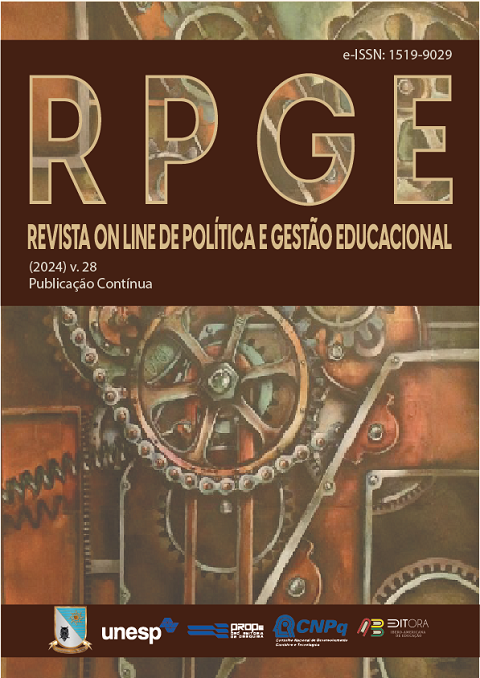Escherichia coli como modelo para evaluar el progreso en el aprendizaje de los estudiantes universitarios de microbiologia
DOI:
https://doi.org/10.22633/rpge.v28i00.19569Palabras clave:
Decolinialidad, EIEC, Patogenicidad, Docencia, Metodología de enseñanza activaResumen
Con el objetivo de evaluar el progreso de los estudiantes de pregrado en la carrera de Ciencias Biomédicas de la USP, utilizamos la metodología “Adopta una Bacteria” en la asignatura de Bacteriología. Nos centramos en la especie Escherichia coli como modelo para explorar conceptos fundamentales en genética, morfología y patogénesis bacteriana. Para validar esta metodología activa, recolectamos métricas relacionadas con la riqueza y la complejidad del discurso generado por los estudiantes a través de sus publicaciones en redes sociales durante 2022 y 2023. Los análisis se realizaron mediante la determinación de índices de Shannon y el uso del lenguaje Python. Los resultados mostraron que las publicaciones sobre los tres temas fueron complejas y evidenciaron un aumento en la riqueza de los discursos de los estudiantes. Se concluye que la estrategia de enseñanza basada en esta metodología amplió el repertorio de conceptos y la complejidad del discurso, promoviendo un mayor compromiso e interés de los estudiantes por la microbiología.
Descargas
Citas
ARMELLINI, B. R. C. Utilização do ensino híbrido no ensino médio e superior com uso do “Adote uma bactéria” como ferramenta para inserção das redes sociais no estudo de Microbiologia. 2021. Dissertação (Mestrado em Ciências) – Universidade de São Paulo, São Paulo, 2021.
BOTTE, D. A. C.; SOUZA, R. D.; PIANTOLA, M. A. F.; ALVES, R. P. S.; FRANÇOSO, O. A. J.; FERREIRA, R. C. C. Microbiologia no ensino superior: “Adote uma bactéria” (e o Facebook). Microbiol. Foco, [S. l.], v. 23, n. 5, p. 5-9, 2014.
DA SILVA, S. F., COLOMBO, A. V. Jogos: Uma Proposta Pedagógica no ensino da Microbiologia para o Ensino Superior. Revista de Psicologia, Vale do São Francisco, v. 13, n. 45, p. 110-123, 2019.
DE SOUZA MOREIRA, B., AZOLA, J. D. S. M., GOUVÊA, C. M. C. P. Marcadores moleculares para identificação e caracterização do potencial patogênico de Escherichia coli e Staphylococcus aureus. SaBios - Revista de Saúde e Biologia, Alfenas, v. 13, n. 1, p. 41-52, 2018.
FREEMAN, S.; EDDY, S. L.; MCDONOUGH, M.; SMITH, M. K.; OKOROAFOR, N., JORDT, H.; WENDEROTH, M. P. Active learning increases student performance in science, engineering, and mathematics. Proceedings of the national academy of sciences, [S. l.], v. 111, n. 23, p. 8410-8415, 2014.
LEGAREE, B. A. Using Facebook to engage microbiology students outside of class time. Journal of microbiology & biology education, Fort McMurray, v. 15, n. 2, p. 301, 2014.
LEVINSON, W. Microbiologia médica e imunologia. São Francisco, California: Editora McGraw Hill Education Brasil, 2016.
MERKEL, S. M. American Society for Microbiology resources in support of an evidence-based approach to teaching microbiology. FEMS microbiology letters, [S. l.], v. 363, n. 16, p. fnw172, 2016.
MORENO, A. C. R.; PASTERNAK TASCHNER, N.; PIANTOLA, M. A. F.; ARMELLINI, B. R. C.; LELLIS-SANTOS, C.; FERREIRA, R. D. C. C. Real Lab Day: undergraduate scientific hands-on activity as an authentic learning opportunity in microbiology education. FEMS Microbiology Letters, São Paulo, v. 370, p. fnad062, 2023.
PIANTOLA, M. A. F.; MORENO, A. C. R.; MATIELO, H. A.; TASCHNER, N. P.; CAVALCANTE, R. C. M.; KHAN, S.; FERREIRA, R. D. C. C. Adopt a Bacterium–an active and collaborative learning experience in microbiology based on social media. Brazilian journal of microbiology, São Paulo, v. 49, p. 942-948, 2018.
RODRIGUES HOFFMANN, A.; PATTERSON, A. P.; DIESEL, A.; LAWHON, S. D.; LY, H. J.; STEPHENSON, C. E.; MANSELL, J.; STEINER, J. M.; DOND, S. E; SUCHODOLSKI, J. S. The skin microbiome in healthy and allergic dogs. PloS one, [S. l.], v. 9, n. 1, e83197, 2014.
SHANNON, C. E. A mathematical theory of communication. The Bell system technical journal, [S. l.], v. 27, n. 3, p. 379-423, 1948.
TASCHNER, N, P, DE ALMEIDA, L. G., POSE, R. A., FERREIRA, R. Adopt a Bacterium: a professional development opportunity for teacher assistants. FEMS Microbiology Letters, São Paulo, v. 367, n. 16, 2020.
TORRISSI-STEELE, G.; DREW, S. The literature landscape of blended learning in higher education: The need for better understanding of academic blended practice. International journal for academic development, [S. l.], v. 18, n. 4, p. 371-383, 2013.
Descargas
Publicado
Cómo citar
Número
Sección
Licencia
Derechos de autor 2024 Revista on line de Política e Gestão Educacional

Esta obra está bajo una licencia internacional Creative Commons Atribución-NoComercial-CompartirIgual 4.0.
Manuscritos aceitos e publicados são de propriedade da Revista on line de Política e Gestão Educacional. É vedada a submissão integral ou parcial do manuscrito a qualquer outro periódico. A responsabilidade do conteúdo dos artigos é exclusiva dos autores. É vedada a tradução para outro idioma sem a autorização escrita do Editor ouvida a Comissão Editorial Científica.











